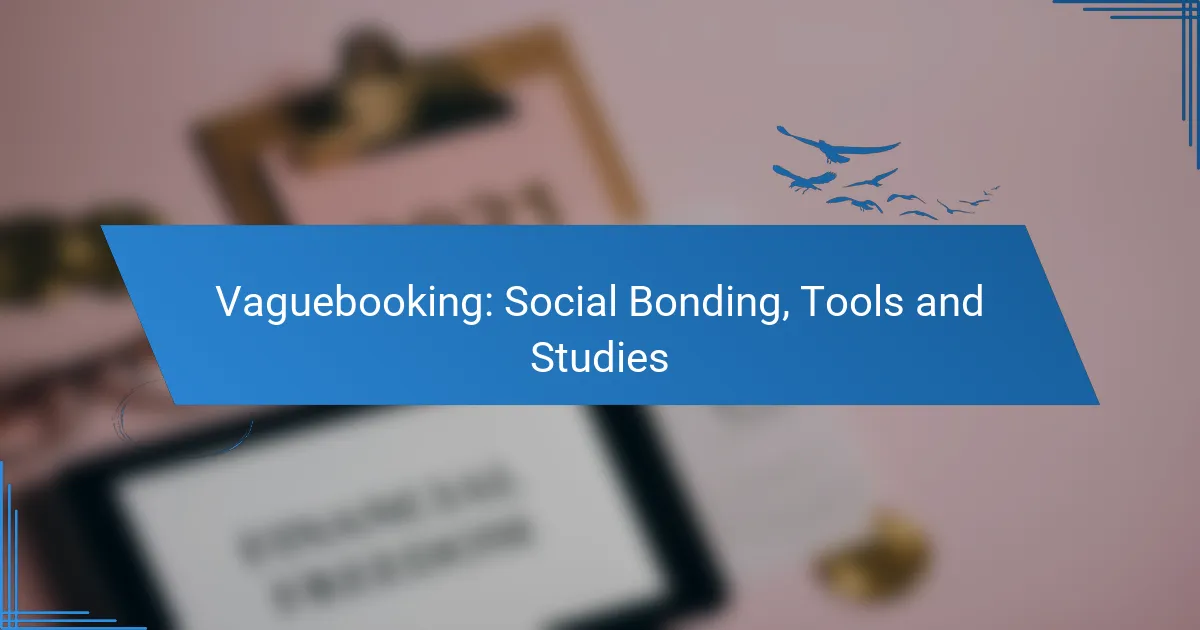Vaguebooking, the act of posting ambiguous updates on social media, serves as a unique tool for enhancing social bonds by fostering emotional connections and community support. This practice, prevalent on platforms like Facebook, Instagram, and Twitter, not only encourages engagement among users but also influences their emotions and social interactions, often leading to feelings of curiosity and a desire for validation.
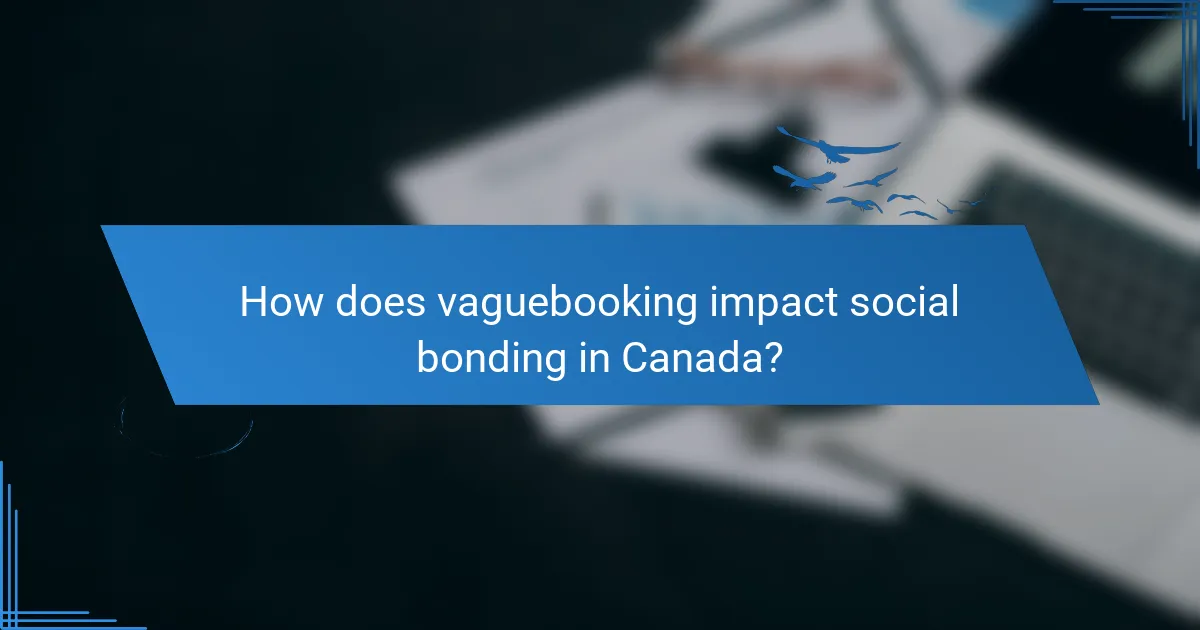
How does vaguebooking impact social bonding in Canada?
Vaguebooking, the practice of posting ambiguous or unclear updates on social media, can strengthen social bonds among Canadians by fostering emotional connections and encouraging support within communities. This phenomenon often leads to increased engagement and interaction among friends and acquaintances, creating a sense of belonging.
Enhances emotional connection
Vaguebooking can enhance emotional connections by prompting curiosity and concern among friends. When individuals share unclear feelings or situations, it invites others to reach out, leading to deeper conversations and shared experiences.
This process often allows users to express vulnerability, which can strengthen relationships. For example, a post about feeling “off” may elicit supportive comments, creating an environment where friends feel comfortable discussing their own struggles.
Encourages peer support
Vaguebooking encourages peer support by creating opportunities for friends to offer help or advice. When someone posts a cryptic message about a challenge, it can lead to an influx of supportive messages and suggestions from their social circle.
This dynamic is particularly beneficial in Canadian communities, where social support networks are valued. Friends may rally around someone in need, reinforcing their bond and creating a sense of collective responsibility.
Fosters group identity
Vaguebooking can foster group identity by cultivating shared experiences and inside jokes among friends. When vague posts are understood within a specific social group, they can create a sense of exclusivity and belonging.
For instance, a group of friends might reference a shared experience through vague posts, reinforcing their connection and identity as a collective. This can be particularly effective in smaller communities where social ties are crucial for maintaining relationships.
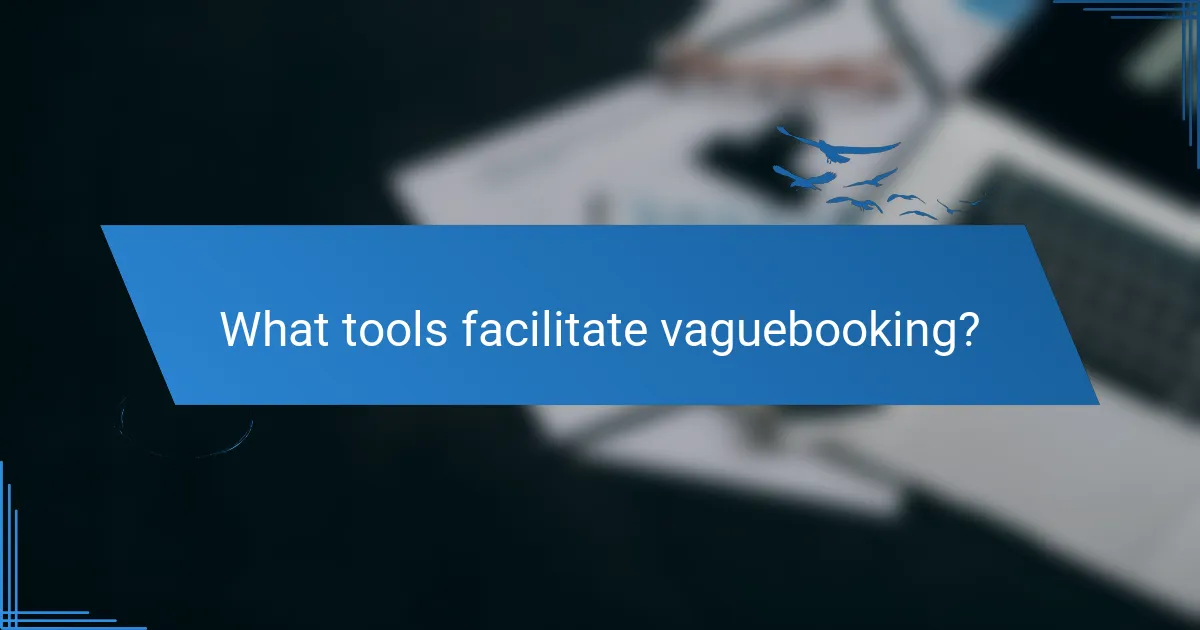
What tools facilitate vaguebooking?
Vaguebooking is primarily facilitated by social media platforms that allow users to share ambiguous posts, creating intrigue and engagement. The most common tools for vaguebooking include Facebook, Instagram, and Twitter, each offering unique features that enhance this form of communication.
Facebook status updates
Facebook status updates are a popular method for vaguebooking, allowing users to post short, cryptic messages that can spark curiosity among friends. These updates can range from simple phrases like “Feeling lost” to more elaborate hints about personal situations.
When using Facebook for vaguebooking, consider the audience; friends and family may interpret messages differently than acquaintances. It’s essential to strike a balance between being mysterious and not overly cryptic, as too much ambiguity can lead to misunderstandings.
Instagram stories
Instagram stories provide a visual platform for vaguebooking, where users can share fleeting images or videos accompanied by vague captions. This format encourages followers to engage by asking questions or speculating about the content.
Utilizing features like polls or question stickers can enhance interaction, allowing users to gauge reactions without revealing too much. However, it’s important to remember that stories disappear after 24 hours, so timing and relevance are key to maintaining interest.
Twitter threads
Twitter threads are another effective tool for vaguebooking, enabling users to post a series of connected tweets that build suspense or hint at deeper thoughts. This format allows for more detailed expressions while still keeping the content somewhat ambiguous.
When crafting a Twitter thread, aim for clarity within the vagueness—use engaging language to draw readers in while leaving enough unanswered to provoke curiosity. Be mindful of character limits and ensure each tweet contributes to the overall narrative without losing coherence.
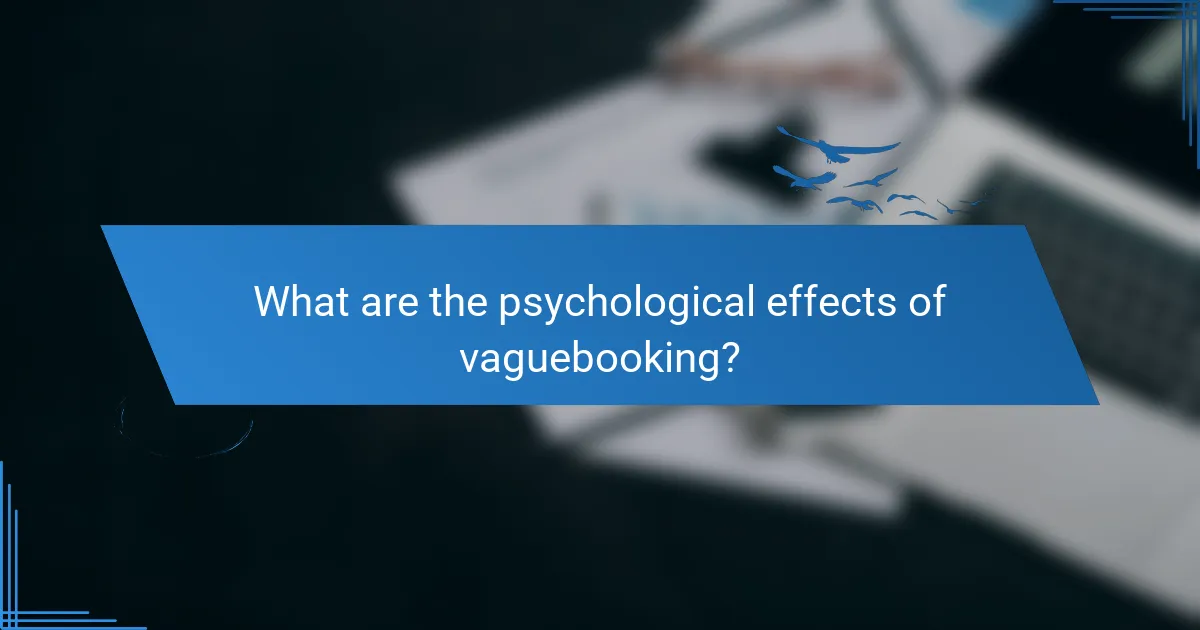
What are the psychological effects of vaguebooking?
Vaguebooking can lead to various psychological effects, primarily influencing users’ emotions and social interactions. This behavior often generates feelings of anxiety, a need for social validation, and heightened curiosity among peers.
Increases anxiety
Vaguebooking can significantly increase anxiety for both the poster and their audience. When individuals share ambiguous posts, it often leads to speculation and concern, creating a cycle of worry and uncertainty.
For example, a post like “I can’t believe this happened” may prompt friends to feel anxious about the poster’s well-being, leading to a barrage of messages seeking clarification. This can create pressure on the poster to respond, further heightening their anxiety.
Promotes social validation
Vaguebooking often serves as a tool for seeking social validation. Users may post unclear statements to elicit responses, likes, or comments, which can boost their self-esteem and reinforce their social connections.
For instance, a post that hints at a personal struggle may attract supportive comments, fulfilling the poster’s need for affirmation. This cycle can become addictive, as individuals may continue to post vague content to receive ongoing validation from their peers.
Triggers curiosity
The ambiguous nature of vaguebooking inherently triggers curiosity among friends and followers. People are naturally inclined to seek answers, and vague posts can spark discussions and inquiries.
For example, a post stating “Big changes are coming!” can lead to numerous comments asking for details, creating engagement and interaction. However, this curiosity can also lead to misunderstandings if the intent behind the post is not clarified, potentially straining relationships.
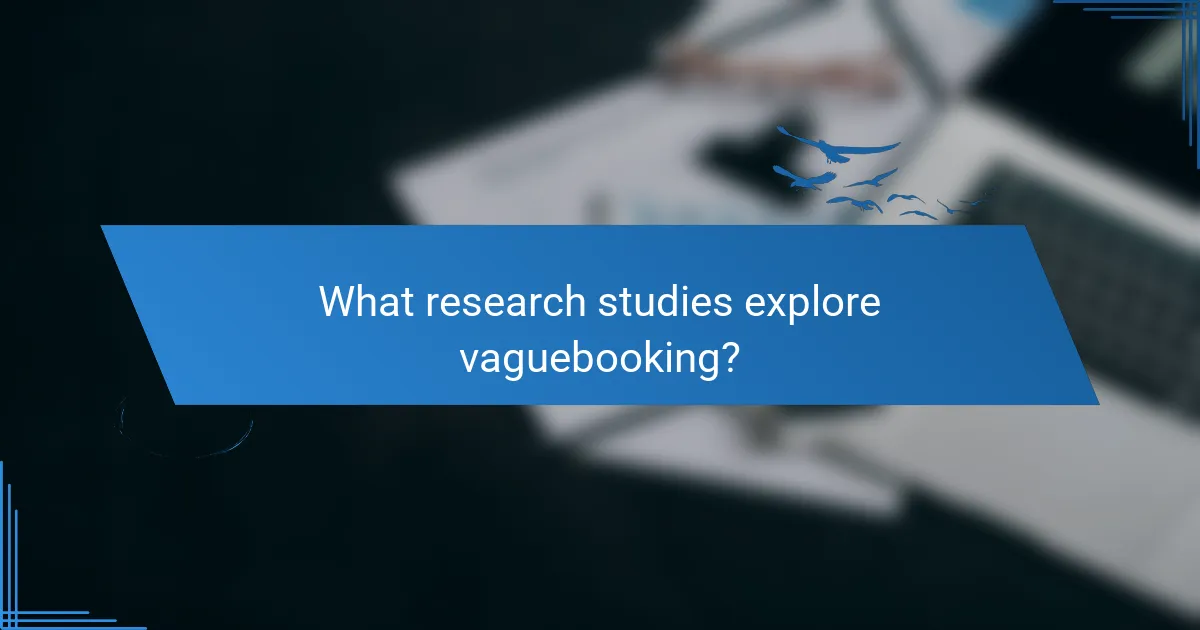
What research studies explore vaguebooking?
Research studies on vaguebooking investigate how ambiguous social media posts impact emotional expression, user engagement, and overall behavior. These studies reveal the psychological motivations behind vaguebooking and its effects on social interactions.
Study on emotional expression
One study found that vaguebooking often serves as a means for individuals to express complex emotions without revealing specific details. This method allows users to seek empathy or support from their social circles while maintaining a level of privacy.
Participants reported feeling a sense of relief after posting vague updates, as it enabled them to share their feelings without the pressure of disclosing personal information. This emotional expression can foster connections, albeit in a less direct manner.
Research on social media engagement
Research indicates that vaguebooking can significantly increase user engagement on platforms like Facebook and Instagram. Posts that are ambiguous often prompt followers to comment or inquire further, leading to higher interaction rates.
Engagement metrics show that vague posts can generate more comments and likes compared to straightforward updates. This interaction can create a cycle where users feel compelled to post more vague content to maintain engagement.
Analysis of user behavior
Analysis of user behavior reveals that individuals who frequently engage in vaguebooking may do so for validation or attention. These users often seek reassurance from their peers, using vague posts as a strategy to elicit responses.
Additionally, the study of demographics shows that younger users are more likely to engage in vaguebooking, possibly due to their comfort with social media and desire for social connection. Understanding these patterns can help in addressing the psychological needs driving this behavior.
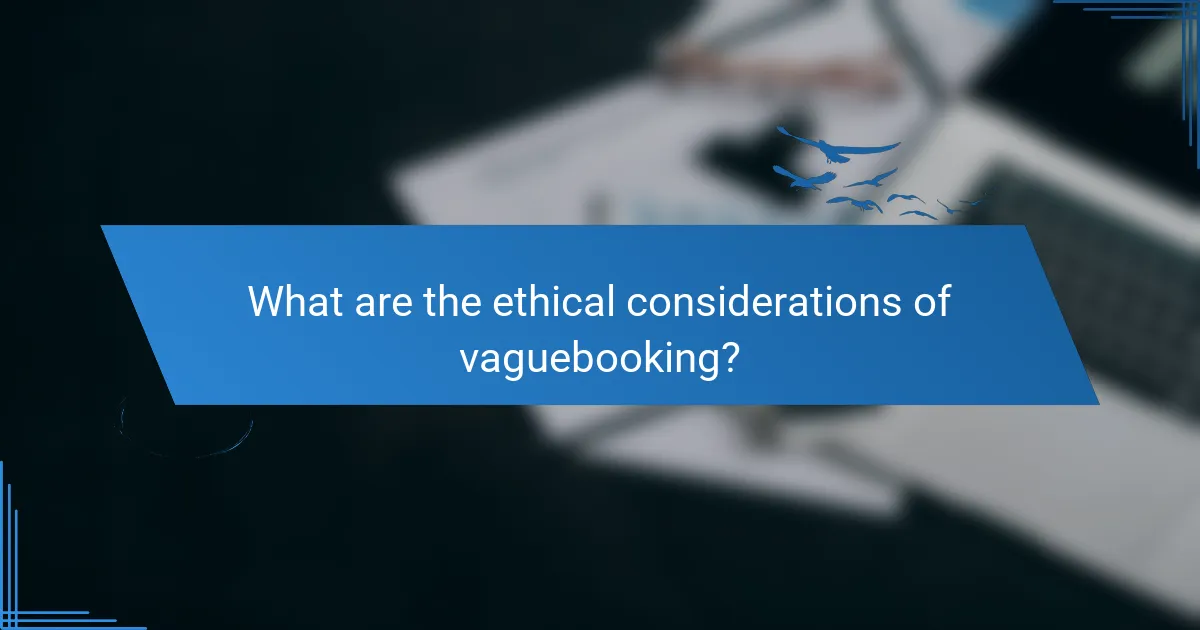
What are the ethical considerations of vaguebooking?
Vaguebooking raises several ethical considerations, primarily surrounding privacy, mental health, and social responsibility. Users often share ambiguous posts that can lead to misunderstandings, emotional distress, or privacy violations for themselves and others.
Privacy concerns
Vaguebooking can compromise personal privacy, as ambiguous posts may inadvertently reveal sensitive information. For instance, a user might share a cryptic message about a personal issue, prompting inquiries that could lead to unwanted attention or speculation.
To mitigate privacy risks, users should consider the potential implications of their posts. It’s advisable to avoid sharing details that could be misinterpreted or lead to invasive questions from friends or followers.
Impact on mental health
The impact of vaguebooking on mental health can be significant, both for the poster and their audience. Individuals who engage in vaguebooking may do so out of a desire for validation or support, but this can lead to feelings of isolation if the response is not as expected.
Moreover, friends and followers may experience anxiety or confusion trying to decipher vague messages. It’s essential for users to reflect on their motivations for posting and consider more direct communication methods when seeking support.
Social responsibility
Vaguebooking carries a social responsibility, as ambiguous posts can affect the emotional well-being of others. Users should be mindful of how their posts might impact friends and followers, especially if they touch on sensitive topics.
To promote a healthier online environment, individuals should strive for clarity in their communications. Encouraging open dialogue and expressing feelings directly can foster stronger connections and reduce misunderstandings within social networks.
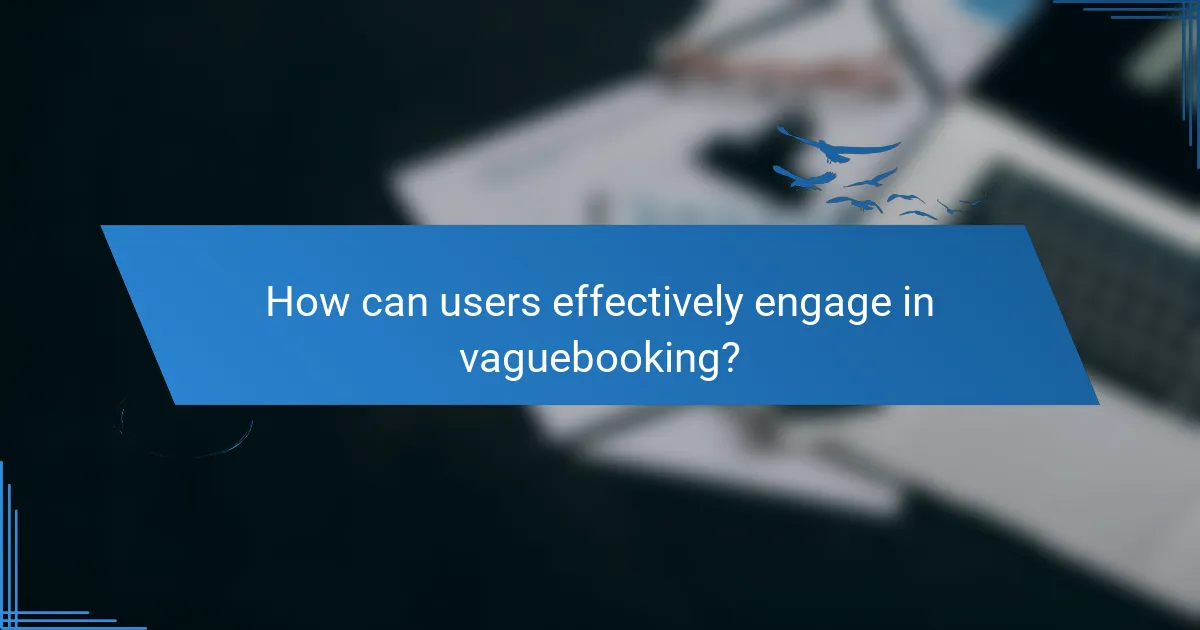
How can users effectively engage in vaguebooking?
Users can effectively engage in vaguebooking by crafting posts that evoke curiosity and invite interaction without revealing too much information. This approach fosters social bonding and encourages followers to inquire further, enhancing engagement on social media platforms.
Crafting ambiguous posts
To craft ambiguous posts, focus on using suggestive language that hints at emotions or situations without providing specifics. For example, instead of stating, “I had a bad day at work,” consider saying, “Today was one of those days.” This invites friends to ask for details while keeping the post intriguing.
Be mindful of the tone; a mix of humor and mystery can enhance engagement. However, avoid being overly cryptic, as this may frustrate your audience. Aim for a balance that encourages dialogue without leaving followers confused.
Using hashtags strategically
Strategic use of hashtags can amplify the reach of vaguebooking posts. Select a few relevant hashtags that resonate with the theme of your post, such as #FeelingLost or #NeedAdvice, to attract like-minded individuals. This can lead to broader discussions and connections.
Limit the number of hashtags to two or three to maintain clarity and avoid overwhelming your audience. Overusing hashtags can detract from the post’s ambiguity and make it appear spammy, reducing genuine engagement.
Timing of posts
The timing of your vaguebooking posts can significantly impact engagement levels. Posting during peak hours, typically in the early evening or on weekends, can increase visibility and interaction. Consider your audience’s habits to determine the best times for your posts.
Experiment with different posting times to find what works best for your followers. Regularly assess engagement metrics to refine your strategy, ensuring your vague posts reach the widest audience possible while maintaining their mysterious allure.
